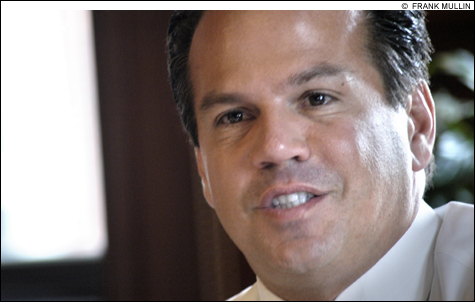Elected officials and pundits offer their take on rhode island’s budget predicament

David N. Cicilline
|
How bad is it?
At a time when most state budgets are flush with surpluses, Rhode Island’s fiscal house remains in disrepair. Although lawmakers defend the budget they passed over a gubernatorial veto last week, a lot of people have reason to be unhappy with the results [see “The worst of your new state budget,” TJI]. More ominously, Rhode Island faces budget deficits for the foreseeable future. Without significant changes, painful cuts and partisan polarization will remain as constants on Smith Hill.
Given all this, we decided to ask a bipartisan selection of political observers and elected officials three questions:
1. In the aftermath of the spending plan backed by the General Assembly, how bad is the budget situation facing Rhode Island in future years? What will be the most adverse consequences if the situation isn’t corrected?
2. How would you fix the situation?
3. How should cuts in state spending be focused? How should the state raise more revenue?
Here are excerpts of what they had to say.
DARRELL WEST
Professor of Political Science, Brown University
1. Rhode Island’s budget situation is a ticking time bomb. There is a mismatch between state spending and income growth, and state leaders continue to make budget decisions at the last-minute without adequate opportunities for public debate. This erodes citizen confidence in government and makes people more cynical about elected officials. Both the governor and General Assembly should give the public more than a week to react to specific proposals. No more popping “solutions” at the last minute without hearings, citizen input, or chance for external review.
2. There needs to be a closer match between increases in the state budget and Rhode Island’s overall income growth. In recent years, spending has risen by nearly twice the growth of income in the state. That trend is unsustainable and needs to be corrected immediately. Right now, state government is passing program costs down to the local level which places tremendous fiscal pressure on local property taxes. The state should not force mandates on localities unless it is willing to fund them. Spiraling local property taxes are strangling taxpayers and making it difficult for businesses to remain in Rhode Island.
3. The state should invest in areas such as education that raise Rhode Island’s long-term ability to train its citizens and compete with other locations. The standard for cuts is whether an area contributes to long-term development. Rhode Island needs a coherent economic development strategy for job creation. Unless higher paying jobs are created, state revenue will stagnate, and elected officials will be even more tempted to turn to gambling to finance the state budget. Gambling is not a good way to grow the economy in the long run. Rhode Island should take advantage of its current advantages in tourism, financial services, biotech¬nology, and education to build its long-term economy.
ARLENE VIOLET
WPRI/WNAC-TV analyst
1. Now that the General Assembly has used up most of the bubblegum and pick-up sticks to plug the hole in Rhode Island’s budget, it’s time for legislators to make structural changes. If they continue to mortgage the future by such gimmicks as using tobacco money, the state will continue to be below the water line. Sensible people will move out before the deluge inundates them with higher taxes, thereby leaving fewer and fewer taxpayers to tread the water.
2. The recent DOT fiasco is exhibit No. 1 of what is toxic to taxpayers. We pay for this set of people in the agency who don’t have the engineering skills to oversee road projects. Rather than saying “sayonara” to them, we just hire another set of consultants to do their jobs. The General Assembly should establish a blue ribbon commission to study the work force and determine what jobs are either unnecessary or filled by incompetents and eliminate the positions.
A statewide health plan for every public employee, including teachers, with reasonable premium costs of 20 percent for those who make more than $50,000, would conservatively save $70 million a year. Stop building unnecessary courthouses. There are hundreds of ridiculous expenditures, like the gas-guzzling SUVs driven by general officers (except Frank Caprio) that should be axed.
3. Focus cuts on the absurd budget expenditures, as above. There should be five school districts, paralleling the counties. Rhode Island doesn’t need to raise revenue — it only needs to learn how to spend it efficiently. When and if the state becomes a model of efficiency, the money will flow since people will want to come here.